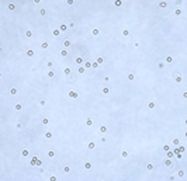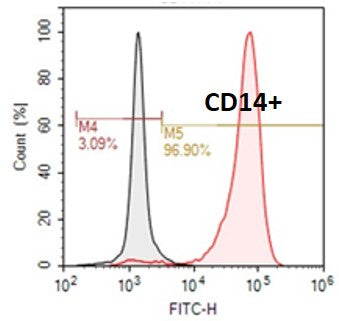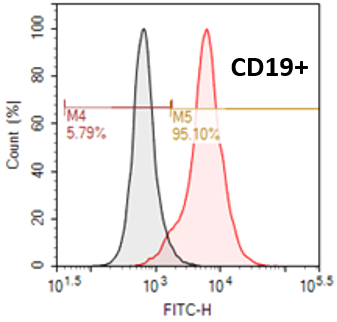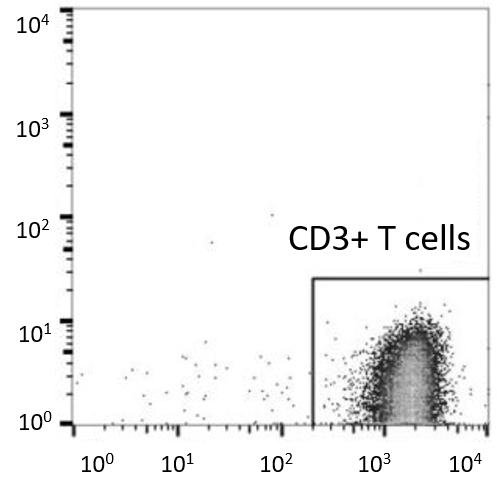Human Normal Peripheral Blood Untouched CD19+/IgD+ Naive B Cells
 Mature naïve B cells, not yet been exposed to any antigen, express CD19 as well as IgD. Upon exposure to an antigen in periphery lymphoid organs, mature naive B cells undergo early primary antibody response by secreting antibody in IgM format. In comparison, IgD molecules function mainly as cell surface receptors for the antigen. The activated naive B cell further proliferates and differentiates into either a memory B cell or an effector cell that secretes antibodies in large quantity. The end stage of maturation for effector B cells is plasma cells which can continuously secret antibodies at 2000 molecules per second. Plasma cells do not last long in the circulation, this is in contrast to memory cells that last for very long periods of time. Memory cells do not secrete antibody until activated by their specific antigen.
Mature naïve B cells, not yet been exposed to any antigen, express CD19 as well as IgD. Upon exposure to an antigen in periphery lymphoid organs, mature naive B cells undergo early primary antibody response by secreting antibody in IgM format. In comparison, IgD molecules function mainly as cell surface receptors for the antigen. The activated naive B cell further proliferates and differentiates into either a memory B cell or an effector cell that secretes antibodies in large quantity. The end stage of maturation for effector B cells is plasma cells which can continuously secret antibodies at 2000 molecules per second. Plasma cells do not last long in the circulation, this is in contrast to memory cells that last for very long periods of time. Memory cells do not secrete antibody until activated by their specific antigen.
Our Human Normal Peripheral Blood CD19+IgD+ Naïve B Cells (PB-CD19/IgD) are isolated in a single-step process that removes non-B cells as well as CD27+ Memory B Cells leaving only CD19+ IgD+ Naïve B Cells. All peripheral blood is collected in acid-citrate-dextrose formula A (ACDA) by leukapheresis from fully consented IRB approved donors that are tested negative for HIV, HBV, and HCV.

~split~
B cell activation

The B-cell co-receptor complex of CD19:CD21:CD81 can greatly enhance B-cell responsiveness to antigen. CD21 (also known as complement receptor 2, CR2) is a receptor for the complement fragment C3d. Whether binding of CD21 enhances B-cell responsiveness by increasing B-cell signaling, by inducing co-stimulatory molecules on the B cell, or by increasing the receptor-mediated uptake of antigen, is not yet known.









